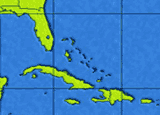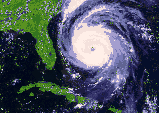 |
|
 |
 |
|
 |
|
Florida Hurricane Wind Damage The strong wind from a hurricane is one of the greatest dangers to people and property because of flying debris. Researchers for the Wind Engineering Research Center at Texas Tech University say that concrete walls are strong enough to withstand flying debris from hurricanes and tornadoes. According to their findings, homes made of concrete are much more storm-resistant than houses constructed of wood and steel. THE RESEARCH STUDY To duplicate hurricane-like conditions in the laboratory, researchers shot wall sections with 15-pound 2 x 4 lumber "missiles" at up to 100 mph, simulating debris carried in a 250 mph wind. These conditions cover all but the most severe tornadoes. Hurricane wind speeds are less than the speeds modeled here. Missile tests designed to demonstrate damage from hurricanes use a 9-pound missile traveling about 34 mph. Researchers tested 4 x 4-foot sections of concrete block, several types of insulating concrete forms, steel studs, and wood studs to rate performance in high winds. The sections were finished as they would be in a completed home: drywall, fiberglass batt insulation, plywood sheathing, and exterior finishes of vinyl siding, clay brick, or stucco. All the concrete wall systems survived the tests with no structural damage. Lightweight steel and wood stud walls, however, offered little or no resistance to the "missile." The 2 x 4 ripped through them. In Urbana, Illinois, a recently constructed insulating concrete form home withstood a 1996 tornado with minimal damage. In the Liberty City area of Miami, several homes built using the shotcrete technique survived Hurricane Andrew in 1992. In both cases, neighboring homes were destroyed. When a hurricane has left an area devastated, there are a number of health hazards to watch out for. Accidents are just waiting to happen, from electrocution by downed power lines, to broken glass, exposed nails, chainsaw accidents and other mishaps related to digging out and cleaning up. Not only that but illness lurks in the form of water contamination, and food spoilage. Illness also occurs because of toilets that don't flush and, garbage that piles up. Tips after a Hurricane Do not examine your home for damage with matches, candles, or other other "flame based" lighting. Use flashlights. Avoid downed power lines. If you stored water in open containers such s bathtubs, do not drink without purifying first.
Back to Florida Hurricane Main Page |